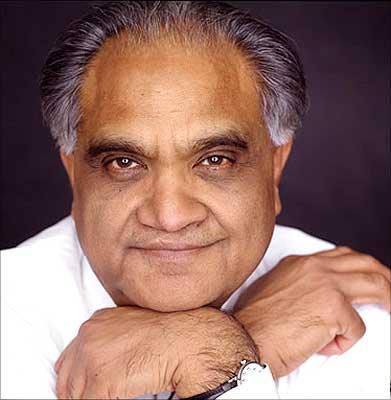 With unhindered access to boardrooms across the world, management guru Ram Charan has mentored CEOs and entrepreneurs alike.
With unhindered access to boardrooms across the world, management guru Ram Charan has mentored CEOs and entrepreneurs alike.
In India for a session with business leaders on 'Building the company of the future' at the Ernst and Young Entrepreneur of the Year Award ceremony, he talks to Business Standard on the difference in coaching an entrepreneur and a CEO and what makes businesses futureproof.
How is it different coaching entrepreneurs from CEOs?
You have to know the person. Entrepreneurs are visionaries since they build what has not been built before. A CEO might be leading a company, expanding what he has and, maybe, in the future has to change. The key point to see is where the difficulties are. Entrepreneurs lack the experience, the skills to expand in scale. A CEO does not.
Learning portals are buzzing with students opting for entrepreneurship. What should they look out for?
First, they need to nurture their ambition. So many opportunities are opening up in India, so there is no dearth of that. The advice is to identify an unmet need, a precise need. It is not very difficult but they have to work at it. It might not come out the first time. But research, research and research.
They should try one, if they don't succeed, they need to try a second one. Opportunities in this sense are huge. You've got to drill down to see what is the customer need that is unmet, undermet or is going to be here. You start here and you will be successful. Until then, you are just going to be wasting a lot of time.
You challenge assumptions that CEOs might have held to get them to see the ground realities. Any assumptions that you have challenged of late that you haven't before?
Most of the CEOs are very interested in new ideas. They need a menu of new best practices and then select what is relevant to them, because no human being is going to know everything. The priorities differ from company to company.
Do CEOs behave differently depending on where they hail from or have things become more homogenised with global companies?
The key here is that some CEOs are good for certain industries and some for others. Do not ever assume that a CEO can work in any industry or a CEO can run all kinds of situations. A few may have a broader range. There are CEOs who are very good in turning around a company, but they are not for growth.
If people switch sectors at a lower level, then they can learn it. That's a good time. Though, there have been exceptions. It is important to figure out a person's gift and what his or her negatives are. Leaders must assess if the negatives come in the way of the person in that role.
If they do ,then that could prove a fatal flaw since it would mean a bad fit. He has to be put in a role where the negatives would not come in the way. I once had to tell the CEO of a company that the vice-president had a negative that made him flounder in his current position. After reallocation, he went on to be happier and more effective.
A CEO would also have to handle external relationships such as labour groups and the government. A CEO who cannot do it, will not work.
Do conflicts arise between strategy and the people who execute them?
No, it is a fact that strategy comes from people. Some human beings think about a strategy and the choice that they make. Strategy will not make them. We need to focus on the people who are going to make that choice. Each of these people will choose people accordingly for their marketing team. It is an observable fact.When consumers are fighting shy of consumption, how would companies go about creating new customers?
Every country, including India, has a range of consumers from extremely rich to people who find it difficult to find food. The entrepreneur has to figure out where these people are whose incomes will support the idea the entrepreneur has.
The new consumers are the ones who are coming into workforce for the first time, or those who are really at the subsistent level. For them you have micro-financing. But there are other consumers who like to have an unmet need met.
For instance, I happen to think that the Nano of Tata Motors is an unmet need - that two-wheelers are unsafe. Also, he (Ratan Tata) concluded that with the Nano, Tata Motors will do a lot of innovation. That's a clear need of not only India, but also another 500 million people.
Is innovation more effective through new products or in looking at new markets?How about innovation through new business models?
When the word 'innovation' is used, the conjecture is a new product or a gadget. That is fine. But you also innovate processes in a business model. The Nano is an innovation in business model because you can't produce a $2,500 car unless you innovate this entire model of manufacturing, cost, logistics and servicing. New products are at the centre of this.
In India, which companies would rank high on innovation?
Wipro GE Medical is very good. It has done innovation and gone rural. It is teaching a lesson to the western world. Even Harsh Mariwala (of Marico) is competing against big competitors. He has a foundation in innovation. As a small company, it is one of the best. I put him in my book last year.
Don't discard the Tata Nano. It is a huge innovation. Through sheer innovation, he (Ratan Tata) has done more service than people realise. You will see him selling some big cars across the globe. I know what the problems were with Jaguar and I know people at Tata know how they affect. I give them three years and you will be trying a great note on Jaguar. He bought it for a good price, by the way.
You enumerated five points to make businesses futureproof - understand customer needs, have determination to serve those needs, find the people to create the right social engine to carry forward that determination, innovate, manage the external environment and create more leaders. Do they vary according to geography or economy?
Those five points have different content in different context. Same points would hold to a different degree in Africa from that in China. In the case of America, most companies will decline if they don't innovate because the commoditisation of products is very fast. In China, you can still get away for sometime without innovation. Eventually, they have to, but right now it is about low cost.
How do you see family businesses in India?
Any family business that will use the right management will do well. The Tatas do it. I think Mukesh Ambani has done it well too. I think he is one of the best CEOs in the world. His confidence is not because he is somebody's son, he is a very competent CEO in his own way. He will be at the top.
How has succession planning changed?
The questions don't change, only the answers do. Every Indian company must think in the global context. So, they can't do succession planning only for India without thinking of making it globally competitive. Then it won't work. If a company does not have anybody who understands cultures of markets, then it won't have a global strategy.
My next book, that I have co-authored, would be on 10 companies that have done exceptionally well in talent management and succession planning. It is called Talent Masters.






